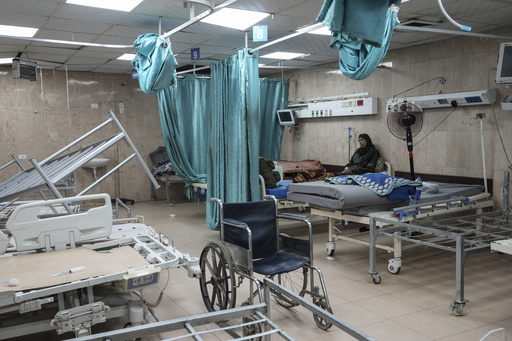
DEIR AL-BALAH, Gaza Strip — A 12-year-old Palestinian boy, diagnosed with leukemia, was found suffering in a hospital bed in central Gaza. Despite receiving morphine, Islam al-Rayahen was in severe pain and malnourished when Rosalia Bollen, a UNICEF representative, visited him in late October. According to Bollen, Islam’s family had made six requests to Israeli authorities for permission to evacuate him from Gaza for a critical stem cell treatment, yet all six were denied for unspecified security reasons. Tragically, Islam passed away just three days after Bollen’s visit.
In the Gaza Strip, countless patients are currently awaiting approval from Israeli authorities for urgent medical evacuations to treat war-related injuries or chronic health conditions exacerbated by the destruction of the region’s healthcare system, a consequence of Israel’s ongoing military operations over the past 15 months. Among those in need are at least 2,500 children identified by UNICEF as requiring immediate transportation for their well-being. Bollen expressed her frustration, stating, “These children cannot afford to wait. They are dying while waiting, and it is striking that the world is allowing this to happen.”
Requests for medical evacuations often take the Israeli military months to respond to, and the number of approved evacuations has dramatically decreased in recent months. There are cases where evacuation requests for either the patients or their accompanying caregivers have been rejected on vague security concerns or without any clear explanation. Moeen Mahmood, the Jordan director for Doctors Without Borders, described these decisions as “arbitrary” and lacking logic or clear criteria.
In a statement, COGAT, the Israeli military’s arm that oversees humanitarian affairs for Palestinians, claimed it “makes every effort to approve the departure of children and their families for medical treatments, subject to a security check.” However, they did not provide any specific details regarding Islam’s case. An anonymous military official noted that internal intelligence reviews determine if patients or their caretakers have “connections to terrorism,” which can lead to rejection of their requests.
Osaid Shaheen, a two-year-old boy, is now facing the prospect of having his eyes surgically removed after his request for evacuation to treat retinoblastoma was denied by Israeli authorities. His cancer was initially diagnosed in April when his mother noticed a droop in his left eyelid. The World Health Organization sought to arrange for his evacuation via the Rafah border, which has been closed since Israeli forces took control in May. Osaid’s case was then submitted for evacuation through the Kerem Shalom crossing, the only operational route. However, during the delay, his cancer progressed significantly, and by November, his request was denied on security grounds without further explanation.
His mother, Sondos Abu Libda, was in disbelief, stating, “I didn’t expect that a child could receive a security rejection.” Doctors managed to administer three doses of chemotherapy, but with dwindling resources in Gaza, they face challenges obtaining more. Should they fail to acquire the needed medication, they will have no choice but to remove Osaid’s eyes to prevent the cancer from spreading further. “How will he live his life without sight? How will he experience joy or envision his future?” she questioned, standing in their temporary home in the Beni Suheil district.
Nearby, little Osaid still has his sight as he plays amidst the debris of a building demolished by Israeli forces, displaying a moment of childhood innocence. The World Health Organization reports that about 14,000 patients across various age groups urgently require medical evacuations from Gaza, while the territory’s Health Ministry indicates the number is higher, at 22,000. Among these, 7,000 patients are in critical need, facing imminent danger without necessary medical intervention.
Since the onset of conflict on October 7, 2023, a total of 5,230 patients have been evacuated, according to WHO spokesperson Margaret Harris. However, following the closure of Rafah in May, the rate of evacuations drastically decreased to only 342 patients, averaging less than two evacuations daily. Prior to the war, when Israeli approval was still necessary, the flow was around 100 patients daily.
The ongoing military actions have resulted in more than 44,500 Palestinian casualties and over 105,000 injuries attributed to Israeli airstrikes and ground offensives. Although these figures, provided by Gaza’s Health Ministry, do not differentiate between combatants and civilians, more than half of the casualties are reported to be women and children. The healthcare infrastructure in Gaza has been heavily impacted, with only 17 out of 36 hospitals currently operational, and those remaining are only functioning partially.
Essential procedures and treatments are now extremely challenging due to destroyed equipment, a shortage of specialized physicians, and inadequate medical supplies. Gaza’s only dedicated cancer center was seized and damaged early in the conflict, rendering it inoperative. In August, Doctors Without Borders attempted to evacuate 32 children along with their caregivers, but only six were permitted to depart. In subsequent months, further evacuation requests for additional children, including a two-year-old with limb amputations, were similarly blocked by Israeli authorities.
According to the military official, five out of eight requests from November had been approved, yet accompanying caregivers were rejected for security reasons. Mahmood, from Doctors Without Borders, highlighted that no explanations were provided for the security problems concerning the children’s mothers and grandmothers.
The situation for children awaiting treatment is increasingly perilous. Nima al-Askari expressed her despair, noting that without surgery within a couple of months, her four-year-old son Qusay, who has a heart defect, risks paralysis. “How can I wait until my son is paralyzed?” she asked. Like many parents,
Asma Saed has been anxiously waiting for three months regarding her two-year-old son Al-Hassan’s approval for treatment for kidney failure. Currently, they are living in a tent camp in Khan Younis, with scant access to clean water and food. Her son’s distress is palpable, as he suffers through sleepless nights filled with wails. “I long for him to be like any other child, able to run and play,” she lamented. “He’s a child and cannot articulate his pain.”

